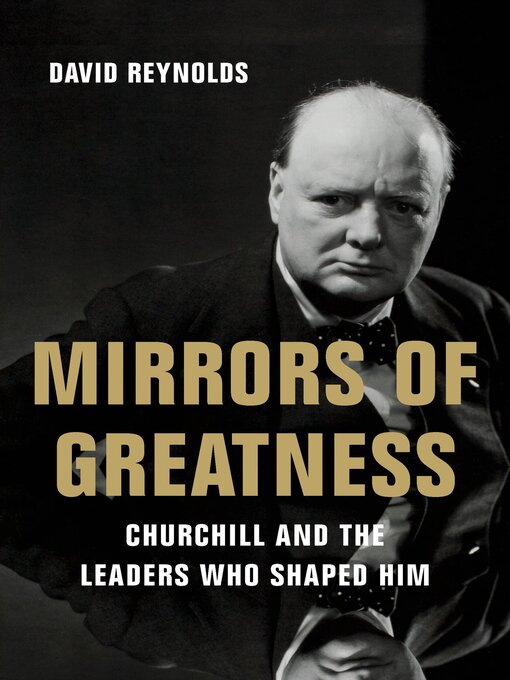- Popular Magazines
- Just Added
- Cooking & Food
- Fashion
- Health & Fitness
- Home & Garden
- News & Politics
- See all magazines collections
Winston Churchill remains one of the most revered figures of the twentieth century, his name a byword for courageous leadership. But the Churchill we know today is a mixture of history and myth, authored by the man himself. In Mirrors of Greatness, prizewinning historian David Reynolds reevaluates Churchill’s life by viewing it through the eyes of his allies and adversaries, even his own family, revealing Churchill’s lifelong struggle to overcome his political failures and his evolving grasp of what “greatness” truly entailed.
Through his dealings with Adolf Hitler and Neville Chamberlain, we follow Churchill’s triumphant campaign against Nazi Germany. But we also see a Churchill whose misjudgments of allies and rivals like Roosevelt, Stalin, Gandhi, and Clement Attlee blinded him to the British Empire’s waning dominance on the world stage and to the rising popularity of a postimperial, socialist vision of Great Britain at home.
Magisterial and incisive, Mirrors of Greatness affords Churchill his due as a figure of world-historical importance and deepens our understanding of his legend by uncovering the ways his greatest contemporaries helped make him the man he was, for good and for ill.
-
Creators
-
Publisher
-
Release date
January 23, 2024 -
Formats
-
Kindle Book
-
OverDrive Read
- ISBN: 9781541620193
-
EPUB ebook
- ISBN: 9781541620193
- File size: 16463 KB
-
-
Languages
- English
-
Reviews
-
Publisher's Weekly
October 30, 2023
Historian Reynolds (Island Stories) doesn’t quite find a fresh angle on the much-studied British prime minister in this energetic if familiar study of “how Churchill learned from others as he rose to national and global prominence.” Reynolds begins with profiles of his subject’s mentors, including Churchill’s father, Lord Randolph Churchill, whose political tactics Churchill adopted early in his career, and prime minister David Lloyd George, who taught Churchill “the language of Radicalism.” Reynolds then moves on to Churchill’s contemporaries during WWII, including his predecessor as prime minister, Neville Chamberlain; allied leaders Franklin Delano Roosevelt and Joseph Stalin; and Charles de Gaulle, who Reynolds contends was very similar to Churchill, arguing that both saw themselves as the embodiment of their country’s core identities. There are chapters on Churchill’s political foes—Adolf Hitler, Benito Mussolini, Mohandas Gandhi, and Churchill’s successor Clement Attlee, who leveraged a productive partnership during the war into a postwar ouster—and his wife Clementine, who supported her husband’s ambitions. Throughout, the analysis of how Churchill was influenced by his mentors, peers, and foes is lightly done. (Reynolds’s conclusion that one of Churchill’s “greatest achievements” was learning “the arts of improvisation,” is a well-observed character assessment, though it appears to be more of an innate talent than something developed in dialogue with others.) This one’s best suited to Churchill completists. -
Kirkus
December 15, 2023
A new biography of Winston Churchill, who may have had the stuff of greatness but also had major flaws. Even from a distance of over 70 years, Churchill remains a fascinating, compelling, and polarizing figure. So much has been written about him that it's difficult to imagine there's anything else to learn. Reynolds, emeritus professor of international history at Cambridge and author of many acclaimed books of history--including FDR's War and From World War to Cold War--tries a new tack, looking at the allies, rivals, and family members who influenced Churchill's psychological and political development. His father was a distant, stern figure, although Churchill later rewrote him as a less unpleasant person. Churchill had some respect for Neville Chamberlain, but he also saw him as overly trusting. He thought that Hitler was essentially a gangster but had a peculiar liking for Mussolini, perhaps because of Il Duce's sense of history and his anticommunist views. Churchill and Roosevelt got off to a rocky start but eventually developed a mutual respect and even affection, which became the core of the "special relationship" between their nations. Churchill's belief in his destiny served him well when Britain was standing alone, but it prevented him from seeing how the world had changed after 1945. He never understood why India would want to leave the British Empire, and he was mystified by Gandhi. Through all this was his wife, Clementine, his sharpest critic and most loyal ally. Reynolds offers some intriguing insights, but he often takes detours to cover well-trod ground, which makes the book a mixed bag for serious students of British history. However, it should appeal to readers seeking to learn more about Churchill's life and times. By looking at those who influenced Churchill, Reynolds sheds some light on his achievements and failures.COPYRIGHT(2023) Kirkus Reviews, ALL RIGHTS RESERVED.
-
Formats
- Kindle Book
- OverDrive Read
- EPUB ebook
subjects
Languages
- English
Loading
Why is availability limited?
×Availability can change throughout the month based on the library's budget. You can still place a hold on the title, and your hold will be automatically filled as soon as the title is available again.
The Kindle Book format for this title is not supported on:
×Read-along ebook
×The OverDrive Read format of this ebook has professional narration that plays while you read in your browser. Learn more here.


